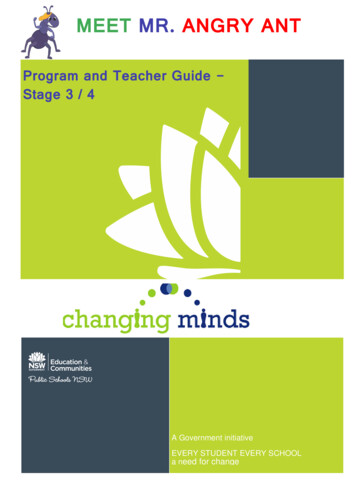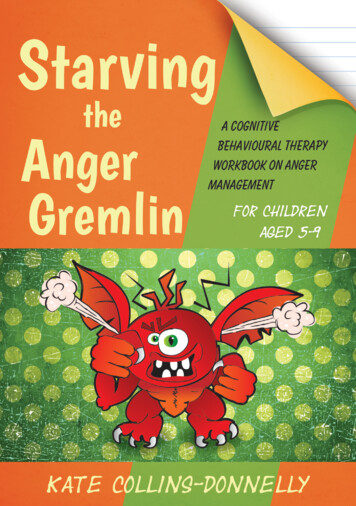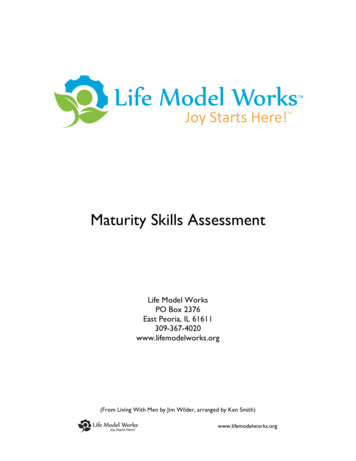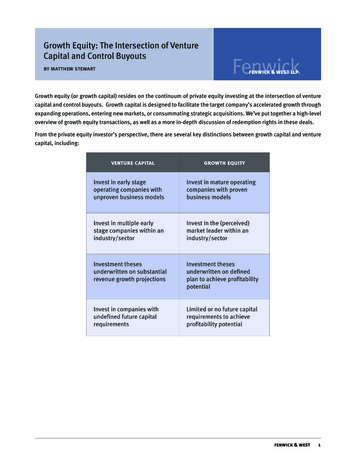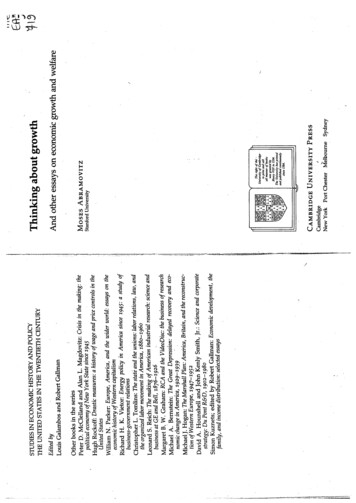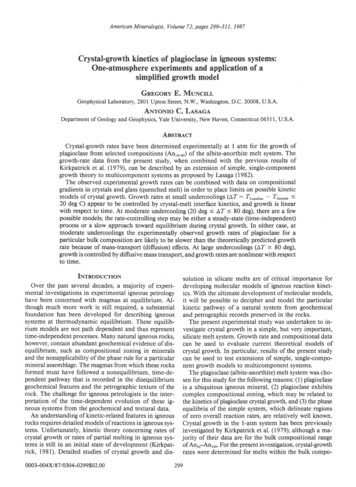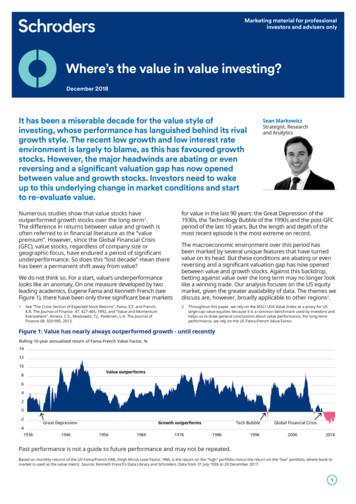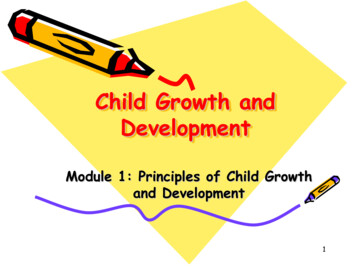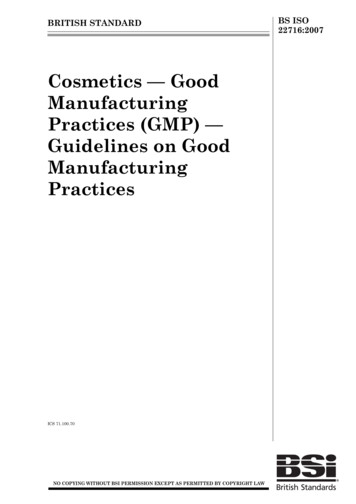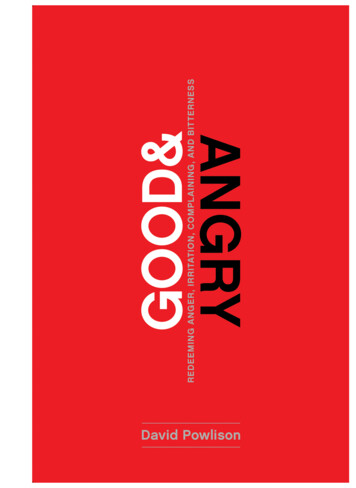
Transcription
“Good and Angry by Powlison now takes its rightful place as my number onerecommendation on anger—not to mention it now stands as the fullest andwisest Christian response to the sub-theme of self-hatred and self-anger I haveever read.”Tony Reinke, Desiring God.com; host of the Ask Pastor John podcast;author of Newton on the Christian Life: To Live Is Christ“If there is any counselor on the planet who is qualified to come alongsideyou and point you to the truth about yourself and the Lord who loves you,it is David Powlison. For decades now he’s been the primary voice of gracesaturated counsel and he speaks from a position of deep wisdom and carefulexegesis. If you or someone you know has a problem with anger, this book is foryou. In other words, everyone should buy it.”Elyse Fitzpatrick, Author of Counsel from the Cross“Endorsing something that has occupied fifteen years of the ‘salt n’ light’ life ofDr. David Powlison is a privilege. As an Anglican priest of an inner-city parish inCharleston, SC; having struggled with and viewed anger ‘up-close-and-personal’in our community, the ‘God tools’ and experiences within the pages of Goodand Angry are personally germane to me. And will enable me to teach othershow to biblically ‘reframe anger.’”The Rev. Dr. Dallas H. Wilson, Jr., Vicar, St. John’s Chapel, Charleston,South Carolina“David Powlison does not treat anger as a disease to be cured or a vice to becrushed. After all, the Bible depicts both Jesus and his heavenly Father as sometimes angry. Expect no comforting nostrums from these pages. Here, instead,you will find biblically faithful probing and gospel hope that will make it possible to be good and angry.”D. A. Carson, Research Professor of New Testament, Trinity EvangelicalSchool, Deerfield, IL; cofounder of The Gospel Coalition“‘This book is vintage Powlison—balanced, insightful, and richly nuanced.Powlison maps our anger (both good and bad) not on a sprinkling of Bibleverses but on the gospel and the breadth and depth of biblical narrative. This isone of those books you not only read, but buy copies to pass to friends.”Paul Miller, Director of seeJesus, author of A Loving Life“It is a rare thing to find a fusion of biblically accurate and personally applicable insight in much that is written about anger. Dr. David Powlison is a stunning exception. He wields his written insight with all the wisdom and care withwhich a shepherd carries a staff to direct and defend the sheep dearly loved bythe greatest Shepherd. His grasp of the Word of God and the heart of humanityis startlingly clear, compelling, convicting, and comforting.”Joseph Vincent Novenson, Senior Teaching Pastor, Lookout MountainPresbyterian Church, Lookout Mountain, TN
“Good and Angry is the best book I have reviewed related to the heart of anger.David Powlison gets the nuances of the heart, and his careful and thorough understanding of anger from a biblical perspective is a significant contribution tothe biblical counseling movement. He shows us that with Christ as our exampleand the gospel as our guide we can forgive, be motivated to mercy, and evenlearn to love our enemies. I recommend this book to anyone who has ever beenangry, loves someone who struggles with anger, and especially to those whodon’t think they have a problem with anger. I pray this book is as helpful to youas it has been to me.”Garrett Higbee, Executive Director, Biblical Soul Care Ministries“David Powlison helps us to think clearly about our anger, no matter whichform it tends to take. This book really is a one-size-fits-all, and the format islike interactive counseling. Whether or not you are already aware of your angerproblem, you need this book. Good and Angry is an exceptional resource foreveryone—from parents and teachers to pastors and missionaries.”Gloria Furman, Cross-cultural worker; author of The Pastor’s Wife andMissional Motherhood“The great thing about David Powlison’s counseling and writing is that he iswilling to get his hands dirty as he brings the gospel into the root problems ofour lives. His discussions not only deal with the realities of our struggles but therealities of his own grappling for help—at a depth most of us are not capable ordaring enough to consider. Yet, as troubling as are the problems he tackles, sorefreshing and realistic are the gospel truths he unearths for us. He digs into hisown heart to help us know how to bring gospel restoration to ours.”Bryan Chapell, Pastor of Grace Presbyterian Church, Peoria, IL“This is the most complete, biblical, insightful, and practical book on anger thatI have ever read. The concepts are clearly explained with plenty of illustrationsfrom the biblical record as well as from our daily lives. It is obvious that theauthor is quite experienced in this field, knowing the personal and interpersonalconflicts that trigger the angry reactions in us. It is hard to think of a person thatwould not be helped by this book.”Miguel Núñez, Senior Pastor, International Baptist Church of SantoDomingo; President, Wisdom and Integrity Ministries“Good and Angry masterfully captures the way every last one of us needs ouranger redeemed and brims with practical wisdom to help that happen. Thisbook moves far beyond anger management, consistently reorienting us to God’sredemptive purposes for anger against real wrongs, while unveiling the lies thatfuel destructive rage and cold-hearted grumbling. I have not read a more soulsearching and refreshing book in a long time.”J. Alasdair Groves, Director of Counseling, CCEF New England“Good and Angry takes a comprehensive look at good anger and destructiveanger. I especially appreciate how David names the more covert forms of anger
such as indifference, withdrawal, and contempt as being just as sinful and destructive as the more aggressive anger of rage and bullying. I will encourage myclients who are in destructive relationships to study this book to gain greaterself-awareness of what’s driving them when anger overwhelms them.”Leslie Vernick, LCSW; relationship coach; speaker; author of TheEmotionally Destructive Marriage and The Emotionally DestructiveRelationship“Far too often in Christian circles our approach to emotions tends toward simplistic and negative. ‘Anger is bad. Stop it.’ That’s why I’m so grateful for DavidPowlison’s robust, redemptive wisdom found in Good and Angry. David teachesus how Christ’s gospel of grace emancipates our hearts so that even the messyemotion of anger can fruitfully and beautifully reflect the holy love of Christ.”Bob Kellemen, Biblical Counseling Chair at Crossroads Bible College;author of Gospel-Centered Counseling: How Christ Changes Lives“I struggle with sinful anger every day. This book is an excellent source of helpin understanding my problem, discerning my motives, examining the lies I tendto believe, and diagnosing the deep roots of sin that compel me to explode inrage or retreat in cold, hateful disdain. In his chapter on anger toward God,Powlison invites us to a courageous honesty that puts us on the pathway torepentance, the sweet and rugged landscape of every believer’s life.”Barb Duguid, Author of Extravagant Grace“I’ve had righteous anger before, I think, but not very often. Most of my angeris more than a little bit unrighteous. In this wise and immensely practical book,David Powlison brings a lifetime of skill at understanding the human heart tohelp us deal with one of the world’s biggest problems: anger, and everything thatleads up to it.”Philip Ryken, President, Wheaton College“David Powlison helps us to see that anger is not a problem to be solved buta natural human response to injustice, things we believe to be ‘not right.’ Theproblem we face is how to respond to what is ‘not right’ without sinning. Powlison helps us by encouraging us to admit our sinful anger problems, exposingthe roots of sinful anger, and teaching us how to ‘express the right kind of angerin the right way.’ I needed this book! And if you’re anything like me, you needit as well.”Juan R. Sanchez, Senior Pastor, High Pointe Baptist Church, Austin, Texas“Throughout the years, Powlison’s works have been such helpful resources toturn to in pastoral ministry. Good and Angry proves to be no different as itprovides keen insight into a very prevalent human emotion. From laypersonto seasoned pastor, this book helps all those looking to investigate the root ofanger. While doing so, Powlison artfully and tenderly brings his readers into theembrace of God’s mercy.”Stephen T. Um, Senior Minister of Citylife Presbyterian Church, Boston, MA
“With characteristic humility and wisdom, David Powlison has produced a richresource on understanding anger. He moves us beyond our reflex to repress andrepent and shows us how our anger can increasingly reflect the loving purposesof God in Christ. The ‘constructive displeasure of mercy’ is a phrase that I willbe meditating on for a long time.”Winston Smith, Faculty, Christian Counseling and EducationalFoundation“All of us struggle with the hot unpleasantness of emotions and desires on thespectrum of anger. This problem frustrates us, saddens us, and often enslavesus. We need a wise and gracious guide to point us to the mercy of God’s Word.David Powlison is a man of peace and his words in this book breathe wisdomand point to Christ’s own grace for change. Since anger is all of our problem,we all need this book.”Heath Lambert, Executive Director of the Association of Certified BiblicalCounselors and Associate Pastor at First Baptist Church Jacksonville, FL“David Powlison is never simplistic. This biblically rich, psychologically insightful analysis puts anger under the microscope and shows us just how complicated it can be. It also shows us how to relate anger to the really big themes ofScripture—grace, redemption, and the restoration of all things. Read this bookand see why anger matters far more than you ever thought it did. Read thisbook and learn how to be both angry and good.”Steve Midgley, Executive Director, Biblical Counselling UK“David Powlison’s Good and Angry will serve as a seminal work in the arenaof biblical care. Providing the reader with a sound conceptual understandingof anger while suggesting rich biblical insights for change, this book containstruths that equip the believer to more effectively address the struggle of angerin its varying forms. Powlison’s style and wisdom are always profound and refreshing. This book is no exception.”Jeremy Lelek, President, Association of Biblical Counselors“This is the opposite of a self-help book; it is a God-help book. Here we findreadable, pithy, and searching reflections on what God says about anger—andits redemption by grace—in the Bible. Highlights include Powlison’s treatmentof the exemplary nature of God’s anger, the multitudinous ways in which ouranger falls short of God’s, and the confusion of Christian defenses of angeragainst God. Again and again, this gentle sage of sanctification leads us back tothe one who overcame our anger, and his, at the cross.”Eric L. Johnson, Lawrence and Charlotte Hoover Professor of PastoralCare, The Southern Baptist Theological Seminary
Good and AngryRedeeming Anger, Irritation,Complaining, and BitternessDAVID OM
New Growth Press, Greensboro, NC 27404Copyright 2016 by David PowlisonAll rights reserved. No part of this publication may be reproduced, storedin a retrieval system, or transmitted in any form by any means, electronic,mechanical, photocopy, recording, or otherwise, without the prior permission of the publisher, except as provided by USA copyright law.Unless otherwise indicated, Scripture quotations are taken from The HolyBible, English Standard Version. Copyright 2000; 2001 by CrosswayBibles, a division of Good News Publishers. Used by permission. All rightsreserved.Scripture marked NASB taken from the NEW AMERICAN STANDARD BIBLE , Copyright 1960,1962,1963,1968,1971,1972,1973,1975,1977,1995 by The Lockman Foundation. Used by permission.Scripture marked NIV taken from THE HOLY BIBLE, NEW INTERNATIONAL VERSION , NIV Copyright 1973, 1978, 1984, 2011by Biblica, Inc. Used by permission. All rights reserved worldwide.Cover Design: Faceout Books, faceoutstudio.comTypesetting and eBook: Lisa Parnell, lparnell.comISBN 978-1-942572-97-8 (Print)ISBN 978-1-942572-98-5 (eBook)Library of Congress Cataloging-in-Publication DataNames: Powlison, David, 1949– author.Title: Good and angry : redeeming anger, irritation, complaining, andbitterness / David Powlison.Description: Greensboro, NC : New Growth Press, 2016.Identifiers: LCCN 2016012175 ISBN 9781942572978 (print) ISBN 9781942572985 (ebook)Subjects: LCSH: Anger—Religious aspects—Christianity.Classification: LCC BV4627.A5 P693 2016 DDC 241/.3—dc23LC record available at https://lccn.loc.gov/2016012175Printed in the United States of America23 22 21 20 19 18 17 1612345
I dedicate this book to Mark and Karen Teears,Barbara Juliani, and New Growth Press. Thank you.Through your persistence, humility, and helpfulness,we have been able to bring this book to publication.We have witnessed a miracle of grace that makes the angels rejoice!
ContentsAcknowledgments xIntroduction 1SECTION 1: OUR EXPERIENCE 1. Angry People 782. Do You Have a Serious Problem with Anger? 233. How Does That Shoe Fit? 25SECTION 2: WHAT IS ANGER? 354. “I’m Against That” 365. All of You Does Anger 466. Nature, Nurture . . . and Human Nature 617. The Constructive Displeasure of Mercy, Part 1: Patience andForgiveness 718. The Constructive Displeasure of Mercy, Part 2: Charity andConstructive Conflict 88
9. Good and Angry? 10410. The Best Anger, the Best Love 114SECTION 3: HOW TO CHANGE 12311. A Mirror on Your Anger 12412. He Gives More Grace 13513. Eight Questions: Taking Your Anger Apart to Put You BackTogether 149SECTION 4: TACKLING THE HARD CASES 17114. “I’ll Never Get Over It” 17215. The Everyday Angers 18916. Do You Ever Get Angry at Yourself? 20217. Anger at God 219A Final Word 233Endnotes 244
AcknowledgmentsI am grateful that my faith was formed and is still being nurtured bymen and women who understand that to live as a Christian is a synonym for living as an honest, wise, and humble human being. Everyhuman capacity, every human activity, every sphere of human lifeis meant to be “very good”—as we once were by creation in God’simage, as we never are because we have fallen hard, as reappears inthe person of Jesus. Because he cares, his anger works as anger ismeant to work, and his mercy speaks the final word in all who lovehim. Because he cares, he is remaking all things human—even thisdifficult, unruly, and destructive thing we call anger—so that webecome like him.
IntroductionWe all have firsthand experience with anger gone wrong. We’vedished it out. We’ve been on the receiving end. We’ve heard and seenothers get angry at each other. At some point in each day you areprobably affected by some form of anger gone bad—either your ownor someone else’s.Often it’s mild—frustrations, complaining, irritation. Often it’sveiled—judgmental thoughts, passive aggressions. Often it’s buried—hidden from conscious awareness, painted over with pleasantries, anesthetized by distractions, busyness, or mind-alteringsubstances. All too often it’s intense—bitterness, hostility, violence.It’s no surprise that when the apostle Paul lists typical sins, half hislist belongs to the anger family (Galatians 5:19–21).And yet anger done right is a great good. It says, “That’s wrong”and acts to protect the innocent and helpless. It says, “That’s wrong”and energizes us to address real problems. God, who is good anddoes good, expresses good anger for a good cause. Jesus gets goodand angry—in the service of mercy and peace. He is willing and ableto forgive us for our anger gone bad. He is willing and able to teachus to do anger right.But it is hard to sort out the good from the bad in anger, isn’t it?And it’s even harder to change when anger has gone bad. Why areproblems that are so common so difficult to solve?
2GOO D A N D A N G RYAll of us are in this boat. It’s hard to do anger right. Unless youhave somehow numbed yourself to the human condition, every oneof us struggles with anger. My chief goal in this book is to teachyou how to more fruitfully and honestly deal with your anger. Yourstruggle with anger (and mine) will last a lifetime, but it can gosomewhere good. We can learn to deal with anger differently.This book is not about “solving” anger problems. That wordsolve suggests that we can arrive. Give us some answers, changesome behaviors, and—just like that—no more problems. It suggeststhat bad anger is simply a bad habit. But anger is not a problem tosolve. It’s a human capacity—like sex, happiness, and sorrow. It isa complex human response to a complex world. And like all humancapacities and responses, it sometimes works well, but too often goesbad. Anger creates problems. But having and expressing the rightkind of anger in the right way is a good goal.I can’t promise you a technique, insight, or strategy that’s foolproof. (When it comes to anger, nothing is foolproof!) I won’t offeryou self-affirming truisms to reframe your self-talk so your moodseven out. I am not going to give you deep-breathing and relaxationtechniques to help you keep your cool. And I definitely won’t encourage you to get in touch with the real you and tell the world how youreally feel.But I do promise you that there are ways to think through andwork through your anger that are wise and true. There are ways ofhandling anger that produce good. There are ways to become morepeaceful in many situations and more cleanly angry in the situationsthat call for it. There are even ways to fail well, so you learn how tofind mercy and pick yourself up again after blowing it.What Do You Bring to the Table?We are going to talk about hard topics. Will you join in? Will youthink hard? Will you speak up honestly? Will you take constructive
I ntrod u ction 3action? We’re talking about anger, after all. It’s the dark, turbulentemotion of destruction.We’ll examine incidents that leave a bitter taste, and whole lifetimes that go sour with accumulated bitterness. We’ll look at volcanic wrath, but also the momentary irritations. I’ve often found thatwe learn the most from the little things, the everyday disappointment, frustration, disagreement, and complaint. What we learntransfers to the big things. It’s like learning to walk before learningto walk a tightrope.If you’re willing to enter the conversation, this book will proveto be about your anger.You picked up this book for a reason. In a constructive atmosphere, in the pursuit of true and living wisdom, why not tackle bigthings? We can talk straight and think carefully about things thatreally matter. Anger really matters.To mess up when it comes to anger is to mess up your life.To get anger straight is to get your life straight.Think about reading this book as an honest conversation aboutsomething that really matters. We are sitting down together at thekitchen table for a long, slow heart-to-heart talk. A good conversation includes pauses to think, sometimes lengthy pauses. Sometimesyou have to come back later and finish what you couldn’t quite putinto words.This book is divided into four sections. The first section willhelp you ask questions and explore your particular experience ofanger. The second section will answer the question what is anger?The third section will tackle how destructive anger is changed intosomething constructive. Then the final section will look at particular difficult cases.
4GOO D A N D A N G RYThree SuggestionsLet me suggest three things about how to read this book. Each is adifferent way to take your time as you read.First, read with a pen in hand. Right from the start I’m goingto ask you to stop and respond. I’ll make statements. So take thetime to write down what you think. Give an example. I’ll ask youquestions. Take time to ponder, explore, and reflect. Jot down youranswers. Keep your pen at hand so that you can write down the gistof what you’re thinking, what you wonder, and where you struggle.Get your real life into the mix. Of course, as the author I get firstsay on the printed page. But your details will make the story cometo life. Each chapter ends with a section entitled “Making It YourOwn” that gives you an opportunity to interact with and respond towhat you’ve read.Second, read with a yellow highlighter next to your pen. Whatstrikes you as you read? Take the time to highlight one sentence oneach page or in each section. At the end of each chapter go back andreread your highlights. Then pick the one sentence from the entirechapter that most strikes you, and consider the following questions: Why did you choose this?What does it mean to you?If you agree, how would your life change if this sentencebecame true of you?If you question or disagree, put it into words.Using your pen and highlighter will help you to notice, stop, andconsider so that you can respond.Third, pay close attention whenever you find yourself thinking, but what about . . . ? The But-What-Abouts—BWAs—are veryimportant. They are the places you collide with what I write. Yousense that something you want to know hasn’t been said yet. The keyquestions that you are asking come to the surface wherever you findyourself wondering BWA ? Your questions bring into
I ntrod u ction 5focus the perceptions and the life experiences that you must makesense of. This book is the product of hundreds of BWAs that I’veasked about anger over many years.The BWAs can create a problem. They get distracting if they talktoo loud and too soon in the process. We stop listening. No conversation takes place. Don’t let your BWAs hijack the process. Writethem down and save them for later.This book invites you to a slowly unfolding meal. If in the middle of appetizers, you suddenly cry out, “But what about the dinnerrolls? What’s for dessert? Who’s doing the dishes?” then you nevertaste the hors d’oeuvres. An important question may pop into yourmind as you read chapter 2, but it might not get answered untilchapter 8. You may strongly disagree with something you read inchapter 5, for which you will find a satisfying explanation, or at leasta plausible suggestion worth considering, in chapter 17.The topic of anger bursts with big questions. At any moment wemay only be snooping around one small answer, but it may buildtoward an answer to your big questions. So take note of your BWAs,and keep reading.If you take this book to heart, you’ll get anger right more often.Yes, you’ll still fail. Perhaps you already know your typical pick ofthe poisons—whether your angers are mild, veiled, buried, or intense. Perhaps you’ve already learned wise things about how to dealconstructively with failure. But wherever you find yourself in theprocess of facing and dealing with anger, God is merciful. He is notsurprised by our blind spots. He is not surprised by our failures.God is merciful. He willingly meets us. He works patiently and persistently. He is merciful and will not give up on you. He will complete the good work that he begins.As you read and ponder this book, I trust that you will grow inself-knowledge. I trust that you will grow more aware of your needfor God’s mercy, strength, and protection. You will grow in knowing your Father, your Savior, your life-giving Spirit. We have it fromJesus himself, sealed with his blood. Ask—he will give. Seek—you
6GOO D A N D A N G RYwill find. Knock—he will open the door and welcome you in. Thereis no script, of course. I know that you will grow in ways impossibleto predict. Sometimes you will be dismayed and discouraged at howhard the road seems.If you lack wisdom, ask God. He does not reproach you forneeding his help (James 1:5). Sometimes you will be delighted andencouraged at how directly and immediately the Lord helps you.And I know that in the end, you will be filled with joy. “I am sure ofthis, that he who began a good work in you will bring it to completion at the day of Jesus Christ” (Philippians 1:6).»»»Making It Your Own1. Were there any places in this introduction where you thought,but what about . . . ?(I’ll make the questions harder in the future!)2. Go back through this introduction with your highlighter andsingle out the sentence that most caught your attention. Why did youchoose this sentence?
Sec t ion 1O ur E xperienceThe next three chapters aim to give you a feel for the destructiveness of anger and for its constructive potential. They aim to helpyou think clearly about your own tendencies. Seeing yourself moreclearly sets the stage. Then explanations and solutions that comelater will connect to where you actually struggle.
Chapter 1Angry PeoplePerhaps you can identify with George Banks in the movie Father ofthe Bride. George (played by Steve Martin) gets into a conversationwith his daughter’s fiancé. He describes her this way,Annie is a very passionate person and passionate people tendto overreact at times. Annie comes from a long line of majorover-reactors. Me, I can definitely lose it. My mother, a nut. Mygrandfather, stories about him are legendary. The good news,however, is that this overreacting tends to get proportionatelyless by generation, so your kids could be normal.Passionate people, major over-reactors, people who lose it. In thehands of Steve Martin such behavior is hilarious to watch, a bitmaddening to live with, and touchingly human all the while.But in real life, anger is the reaction that incinerates marriagesand disintegrates families. It energizes gossip and guns down classmates. It divides churches, turns friendship into enmity, and eruptsin road rage. It is the stuff of every form of grievance and bitterness.The fact that some of us overreact in less colorful ways does notmean that those who are quiet are not angry. Anger is also the basicDNA of complaining, brooding, irritability, and bickering. The“shoes” of problem anger are like a pair of open-heeled bathroomslippers. One size really does fit all. The crucial issues in anger touchevery one of us.
A ngry P eopl e 9This book is for all of us because we all experience anger. Ifyou’ve always been strong-willed, argumentative, and volatile, youare in these pages. If a lifetime of disappointment and disillusionment has left you embittered, this is for you. And even if you’re quieter, you’re in this book too. In the way we do anger, some of usexplode, some of us simmer, some of us seem dormant—but all ofus experience anger. And if we don’t, it’s because we’ve anesthetizedourselves or detached.For example, I was born easygoing. I can take no credit that myinnate disposition is low-key. For many years I didn’t think I had ananger problem. I found angry people puzzling and a bit intimidating. Why do they bother to get so bent out of shape over that? Buteither I’ve become a worse person as I’ve gotten older, or I’ve learnedto know myself a bit better. Quiet brooding, defensive withdrawal,judgmental thoughts, low-grade irritability, a critical attitude, avoiding outright conflict, indifference to reparable wrongs—these arejust my less dramatic brands of an anger problem. My personal tendency has never been to go on the offensive with frenzied hot war.I’ve specialized more in keeping a safe distance from conflicts—and,if necessary, engaging in a cold war.Why would I of all people write a book on anger? My interestin anger has grown as I have come to realize that I too (in my ownquiet way) am part of the problem of anger, not simply an observeror victim of others’ anger. At the same time, I’m trying to help otherpeople, some of whom operate in the incendiary mode, some whoare deeply embittered, and some who are rather like me. We all needhelp.I’ve known lots of angry people. During my last year in collegeI worked as the Saturday night bouncer at the Club Casablanca.On numerous occasions I got up close and personal with extremelysurly customers. One reeling drunk got so incensed when I escorted him out of the bar that he threatened to come back with agun and kill me. I quit on the spot rather than waiting to find outif he meant it.
10GOO D A N D A N G RYWorking in psychiatric hospitals for four years provided a steadyeducation in the out-workings of bitterness and hostility. Forty hoursa week on locked wards is an education in the dark things in thehuman soul. A lot of anger comes out in a psychiatric ward. And ithas many unhappy companions: confusion, heartache, deceit, selfpity, fear, and—saddest of all—false hopes, shattered hopes, and nohope. I became familiar with an abyss of miseries to which none ofus is immune.Yes, I’ve known lots of people—including the person I see in themirror—for whom anger goes bad, rather than doing good. Now,after more than forty years of doing counseling ministry, I could assemble a Hall of Fame—a roster of bitterness, destructiveness, andsheer unhappiness—called “Angry People I Have Known.” Let’slook at several examples.Domestic GunslingersAnger is not just a strongly felt emotion that takes place inside us.It’s interpersonal. It affects others. I once counseled a couple whohad a gunfight in their suburban house. Willy was upstairs withthe pistol, Brenda downstairs with the rifle. They’d had words—the usual, daily bickering. It had gotten more heated than usual.Finally, ugly words escalated into domestic World War III. A halfdozen rounds of live fire zinged up and down that stairway! Theirmarital dispute blasted bullet holes in the sheetrock, scared thedaylights out of the neighbors, and brought police sirens wailingto their door. Talking with me was part of their court-mandatedalternative to felony charges. For some reason I’ve never forgottenthis story!You’ve probably never been in a gunfight. I never have either. Butone landmark in
anger redeemed and brims with practical wisdom to help that happen. This book moves far beyond anger management, consistently reorienting us to God’s redemptive purposes for anger against real wrongs, while unveiling the lies that fuel destructive rage
